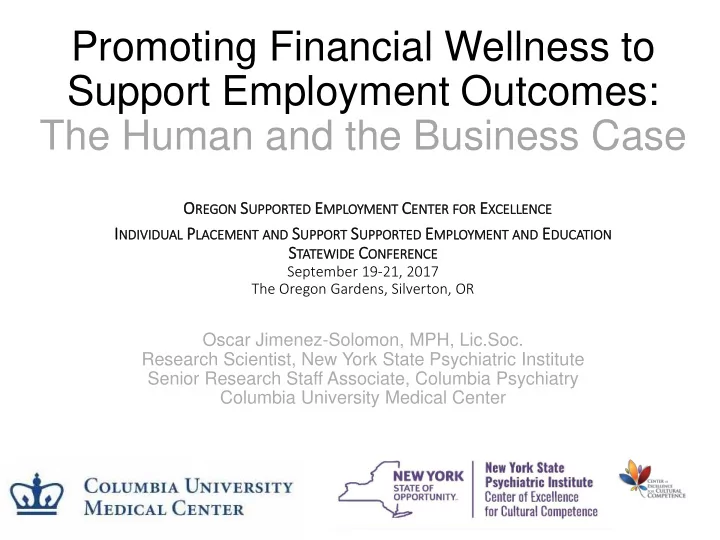

Promoting Financial Wellness to Support Employment Outcomes: The Human and the Business Case O REGON S UPPORTED E MPLOYMENT C EN ENTER FOR E XCE CELLENCE I NDIV IDUAL P LA AND S UP UPPORT S UP UPPORTED E MPLOYMENT AND AND E DUC DIVID LACE CEMENT AND DUCATIO TION S TATEWID IDE C ONFERENCE September 19-21, 2017 The Oregon Gardens, Silverton, OR Oscar Jimenez-Solomon, MPH, Lic.Soc. Research Scientist, New York State Psychiatric Institute Senior Research Staff Associate, Columbia Psychiatry Columbia University Medical Center
Impact of economic exclusion on Im emotional and soci cial well llness Psychological distress: depression, anxiety, Low self- hopelessness esteem & Poor low self- quality of efficacy life Economic exclusion: Poverty Dependency Financial stress Social Life isolation dissatisfaction Poverty- induced shame Source: Jimenez-Solomon, O., Mendez-Bustos, P., Swarbrick, Diaz, S., DeSilva, S., Kelley, M., Duke, S., & Lewis-Fernandez, R. (2016). Peer-Supported Economic Empowerment : A Financial Wellness Intervention Framework for People with Psychiatric Disabilities. Psychiatric Rehabilitation Journal 39 (3), 222 – 233.
“Poverty trap:” desire to work but limited by public benefits Life instability: housing, food, transportation, etc. Addressing the Limited access to ed opportunities linkages between Shame & Isolation Poor social capital poverty & Lack of info about work incentives unemployment and other financial supports Hesitation to take employment & financial risks POVERTY & ECONOMC LOW EMPLOYMENT INTEGRATION: EXCLUSION Unwillingness to pursue employment Dependency Practical barriers for employment Financial instability & stress Higher risk of losing employment Financial Insecurity Limitation to advance employment, increase income and assets Lack of financial control Financial exclusion Dependency on public benefits Employment gaps: limited work experience & skills, impact on income Fewer assets for social mobility (e.g., retirement, property, education) Social and material capital limited to MH and Source: Jimenez-Solomon et al. Promoting Financial Wellness to social services programs Support Employment Outcomes: the Limited access to formal financial services (e.g., Human and the Business Case. (in banking, credit, counseling/planning) prep) Less developed money management skills
Why Promote Financial Wellness in Employment Programs? ✓ Overcome “poverty trap” (having desire to work, and yet fear of losing cash/health/housing benefits) = main barrier to employment ✓ Address work-related changes and opportunities: • Income increase, benefit changes, new housing, new expenses, new options & decisions • Budgeting and financial planning become a necessity. • Need for support around money & financial issues increase • Opportunity to engage in formal financial supports (e.g., banking, tax benefits, retirement) ✓ Improving financial wellness (stability, security, autonomy, & control) can improve employment outcomes: • Willingness to take employment and benefit-related risks • Job retention (e.g., reduced financial/life stress, increase stability) • Willingness to increase number of hours/pay/risk reducing dependency on public benefits
Fin inancial Wellness Domains: Fiv ive Core Capabilities economic citizenship: exercising financial economic rights stability: & responsibilities financial income to security: meet one’s asset-building needs, rainy-day funds repay F INANCIAL debts, plan W ELLNESS future financial financial control: autonomy: self-payeeship Self-sufficiency financial decision- from public benefits making Source: Jimenez-Solomon, O., Mendez-Bustos, P., Swarbrick, Diaz, S., DeSilva, S., Kelley, M., Duke, S., & Lewis-Fernandez, R. (2016). Peer-Supported Economic Empowerment : A Financial Wellness Intervention Framework for People with Psychiatric Disabilities. Psychiatric Rehabilitation Journal 39 (3), 222 – 233.
Peer-Supported Economic Empowerment Process 1. Financial wellness engagement: Engaging individuals in culturally 6. Mutual emotional & meaningful conversations about life social support to dreams & financial goals achieve financial goals (e.g., overcome shame, fear, paralysis, isolation) 5. Supporting individuals to 2. Building financial hope: navigate and utilize financial inspiring & reframing self- services & asset-building defeating narratives supports (e.g., work incentives, bank accts, tax credits, matched & tax-free savings, free financial Source: Jimenez-Solomon, O., counseling) Mendez-Bustos, P., Swarbrick, Diaz, S., DeSilva, S., Kelley, M., Duke, S., & Lewis-Fernandez, R. (2016). Peer-Supported Economic 4. Financial 3. Financial wellness Empowerment : A Financial skills coaching: Wellness Intervention Framework assessment & action personally for People with Psychiatric planning Disabilities. Psychiatric relevant, hands- Rehabilitation Journal 39 (3), 222 – on skill building 233.
Source: Jimenez-Solomon, O., Mendez-Bustos, P., Swarbrick, Diaz, S., DeSilva, S., Kelley, M., Duke, S., & Lewis-Fernandez, R. (2016). Peer-Supported Economic Empowerment : A Financial Wellness Intervention Framework for People with Psychiatric Disabilities. Psychiatric Rehabilitation Journal 39 (3), 222 – 233.
http://www.nyaprs.org/community-economic- http://www.nyaprs.org/community-economic- development/toolkit/documents/WCSparticipantworkboo development/toolkit/documents/WSSproviderfinal2012_0 kfinal.pdf 03.pdf 29
Supporting Financial Wellness is to…Dare Greatly “It is not the critic who counts; not the man who points out how the strong man stumbles, or where the doer of deeds could have done them better. The credit belongs to the man who is actually in the arena, whose face is marred by dust and sweat and blood; who strives valiantly; who errs, who comes short again and again…who at the best knows in the end the triumph of high achievement, and who at the worst, if he fails, at least fails while daring greatly….” T. Roosevelt
Contact Oscar Jimenez-Solomon, Lic.Soc, MPH Research Scientist & Research Coordinator NYS Center of Excellence for Cultural Competence New York State Psychiatric Institute Senior Research Staff Associate, Columbia Psychiatry Columbia University Medical Center o: (646) 774-8247 c: (347)978-3010 Oscar.solomon@nyspi.columbia.edu
Recommend
More recommend